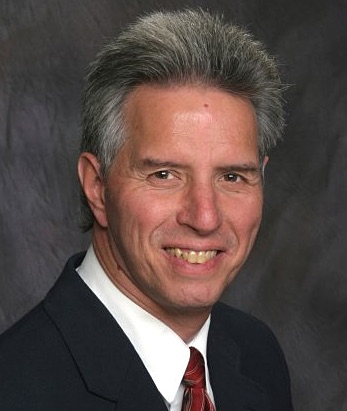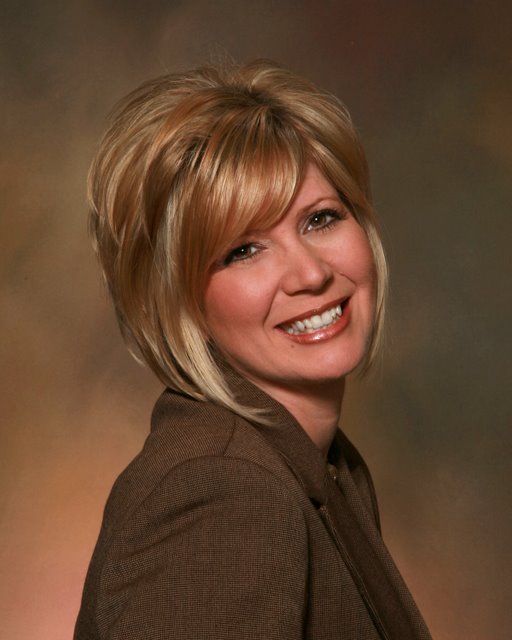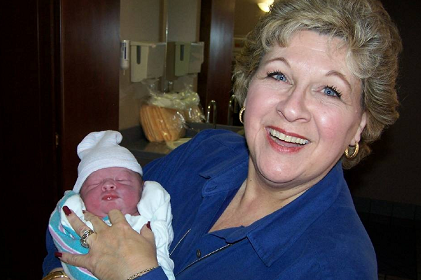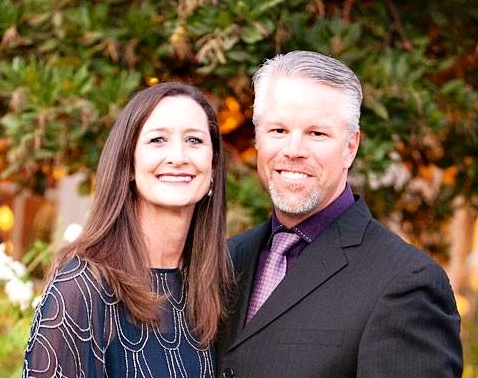Jennifer Wright
Revolutionary Thinking: Love Each Other
by Kirk Walden, Advancement Specialist
Valentine's Day brings thoughts of chocolate, cards, cute little stuffed animals, candlelight dinners and so much more. The merchants love this day, filling greeting card racks with hearts and cupids the week after Christmas. We are flooded with advertisements, reminding us to honor our chosen Valentine appropriately (errr, expensively!).
Yet, Valentine's Day is also a great time to reflect on love, real love. Powerful love. Life changing love.
If we are honest, all of us are on a continuing journey to better understand love and to grow in our love for God and our love for those around us. None of us on this Earth today has the idea of love completely figured out. None of us is perfect in accepting love, and none of us lives out a flawless life of giving love.
The good news? We have a perfect example in Jesus. Having lived among us, he knows something about how difficult it can be to love. He knows the struggle of conflict, he knows what it means to be misunderstood, and he knows—better perhaps than any of us—the pain of rejection.
As we follow Jesus and look to emulate his love, he brings words of incredible hope in John 13:34, giving all of us a starting point for understanding the true nature of love.
Talking to the disciples, Jesus says, "A new commandment I give to you, that you love one another."
Was this commandment actually "new?"
Yes. To the disciples in fact, relating love to living out faith in this world was actually revolutionary thinking. Here is why:
The disciples knew, and tried to follow, the Old Testament Law. Yet, while there were many commandments in this Law, there were no laws commands focused on loving others. Yes, there were many regulations on how to treat others, but no specific teachings on loving others.
God sent Jesus to introduce love in a new way. We see this in Jesus' Sermon on the Mount, where the Lord takes many Old Testament laws and adds to them, "But I say to you . . . ." He was introducing a higher standard for our thinking and behavior based on a foundation of love.
Today, we still have this "new" foundation for our faith which weaves a tapestry throughout our lives: Love.
If every action we take is launched from love, the world changes. If the truth be known, the world around us is not quickly attracted to faith's perspective on social issues (such as life), behavior and relationships.
The world however, is always attracted to those who truly love others selflessly. Jesus knew this, showing us that if we love, we are more likely to move a culture toward God.
Valentine's Day can be fun and full of nice surprises. Yet there is a greater love that can be new every day.
So take heart. If our launching point for each day is love, we are on the right track. Jesus tells us so, and he changed the world.
Introducing: Dr. Anthony Levatino
Honored member of Heartbeat International's Medical Advisory Council
A great man with an amazing testimony
Meet Dr. Anthony Levatino, honored member of Heartbeat International's Medical Advisory Council, who was featured in World Magazine January 22, 2015. The article details his journey from abortionist to pro-life advocate, including opening a pregnancy center and being medical director for two pregnancy center medical clinics. To read his full story click here. We are glad to recognize Dr. Levatino as part of our Medical Advisory Council.
Tweet this! Meet Dr. Anthony Levatino, honored member of Heartbeat International's Medical Advisory Council

On the left, Dr. Levatino is pictured giving testimony before a congressional subcommittee in support of a bill that would ban abortions after 20 weeks. To see his full testimony click here.
What You Need to Know About the Dangers of Prenatal Tests
By Susan Dammann, RN, LAS, Medical Specialist
Reporting in Prenatal Tests: What Patients Should Know published in Medscape News and WebMD, Kathleen Doheny described a recent investigation revealing there are significant inaccuracies in non-invasive prenatal screening and that some women and doctors are misinterpreting the positive results from the new generation of prenatal tests including MaterniT21Plus, Verifi, Panorama and Harmony. In some instances, women are terminating their pregnancies because of it. This decision appears to be based on the screen alone without obtaining tests to confirm a negative diagnosis.
Beth Daley from the New England Center for Investigative Reporting in an excellent article Overused and Misunderstood stated "a three-month examination by the New England Center for Investigative Reporting has found that companies are overselling the accuracy of their tests and doing little to educate expecting parents or their doctors about the significant risks of false alarms."
"All claim to offer expectant parents the chance to know with almost 100% accuracy, and as early as 10 weeks into a pregnancy, the likelihood that the developing baby has any genetic abnormalities such as Down syndrome, Edwards syndrome (trisomy 18), Patau syndrome (trisomy 13), or a few other chromosomal anomalies" writes Nora Sullivan with the Charlotte Lozier Institute in her article Non-invasive Prenatal Screening Expands Disability Discrimination Abortion.
Daley goes on to say: "A screen is a test given to a general healthy population and usually has high sensitivity so that any possible problems are flagged. Because of the high sensitivity, false positives are more common. Also, screens are not necessarily approved by the FDA. Because of a loophole from the 1970's, these types of screening tests are not subject to the same regulation as other medical devices or procedures. A screen is always supposed to be confirmed with a diagnostic test. A diagnostic test is designed with high specificity for a particular condition flagged by the screen. It is often more invasive and is meant as a tool to make a definitive diagnosis."
The problem appears to be not understanding a "statistical blip" in how the test results are reported or what is called "positive predictive value". What is critical for both health care providers and patients to understand is that the test is a "risk-based test" not a diagnostic test and a positive test result is only indicative that they have a higher risk of having that particular issue. The article reported that in the general population of women, a well-regarded study published in the New England Journal of Medicine showed that the test was correct for only about 40% of women who tested positive for Edwards syndrome (trisomy 18).
Daley said, "If companies are presenting these screens to be as good or better than a diagnostic test, doctors believe them and parents are aborting as a result, then the companies are seriously negligent."
Therefore if a patient comes into a pregnancy center considering abortion if/because test results come back positive, it is important to educate the patient that this test is only a screening for risk. A positive result is only an indication that their risk may be higher, but the test result could be wrong and a confirmatory test like a CVS (chorionic villus sampling) or an amniocentesis is needed to be sure. A patient should always get a confirmation with an FDA approved diagnostic test.
Aborting a child due to a genetic abnormality is disability discrimination. Prenatal tests should never be used for such purposes. When a disability is discovered rather than termination, options for the provision of treatment or hospice care should be offered.
Armed with the information above, we can help women who may be determined to abort due to a negative diagnosis to get further testing for verification. This will facilitate additional time to help them with alternative options should the diagnosis be positive.
Diagnosing the Attempted NARAL Attack
by Susan Dammann, RN, LAS, Medical Specialist
As we examine the symptoms exposed in the recent report unveiling the state chapter of NARAL Pro-Choice America colluding with Maryland government officials, a diagnosis becomes quite clear. This legal effort to shut down a local pro-life pregnancy care center, along with a seven-part plan developed by NARAL to shut down pregnancy help organizations across the country, reveal an infection with the intention to spread.
Miriam Webster defines diagnosis as"the act of identifying a disease, illness, or problem by examining someone or something."
First, there is definitely a primary source of infection, still seemingly localized, and the infection's focal point is limited to a small segment of the population. In 2010 when "Montgomery County passed an ordinance requiring Centro Tepeyac Silver Spring Women's Center and other pro-life pregnancy care clinics to post signs stating that they did not have doctors on staff," the outbreak was cured by three court decisions against the ordinance.
"Judge Deborah Chasanow, a Clinton appointee, noted that the people who accused the centers of spreading 'misinformation' were 'universally volunteers from a pro-choice organization sent to investigate practices' at the centers."
[Read Heartbeat President Peggy Hartshorn’s Op-Ed at LifeSiteNews.com here.]
When we learn of such outbreaks it is common to wonder if this will erupt into an epidemic or pandemic. Then we wonder how we can immunize ourselves from being attacked by the same germs.
The very best way to inoculate ourselves is to do just as they have already given us credit for doing!
The County responded to NARAL with the following statement: "I doubt my colleagues or the County Attorney will be interested in pursuing a truth-in-advertising statute...[these centers] are clearly very artful at devising strategies to avoid violating the law." Strategies to avoid violating the law simply put, means we obey the law and they recognize it. Your best immunization plan is to keep up your mission and the excellence with which you always work. You can always take your organization's vital signs by checking up on our Commitment of Care and Competence.
It would be a misdiagnosis if we thought we could treat these germs by pregnancy help organizations hiring doctors and nurses, putting in state of the art equipment and following all the best practices so that they will approve of us and stop the attacks. We have done just that and they are still manipulating women with lies and misleading information.
True choice and excellent healthcare for women are not their goal. The accurate diagnosis is that the abortion industry has a goal of permanently eliminating pregnancy centers because we are undermining their bottom line of profit.
Keep in mind that we do not live in a sterile environment and that germs abound. We can expect that by making inroads to bring health and wholeness into our world, there may be attacks. This is to be expected, but not feared. God even tells us in His Word that we may suffer for the sake of righteousness, but we are blessed.
"But even if you should suffer for the sake of righteousness, you are blessed. And do not fear their intimidation, and do not be troubled." 1 Peter 3:14 NASB
What Insurance Should We Carry?
 by Paula Burns, CIC, CRM, Insurance One Agency, LLC
by Paula Burns, CIC, CRM, Insurance One Agency, LLC
Knowing what kind of insurance your Pregnancy Help Organization may need can be difficult. Beyond the general questions of what should be covered, each state has specific mandates or benefits about certain types of insurance. We sat down with Paula Burns from Insurance One Agency to find out what they would recommend.
Pregnancy Help Organizations (PHOs) are on the front line in the battle to save human lives and souls. They are the ultimate picture of the “Great Commission” coming to fruition and want every ministry dollar to go into the purpose and mission of the ministry, not into liability litigation. As a result, there are many questions frequently proposed regarding insurance for the centers and the wide scope of risk associated with them. This article includes a brief overview of insurance coverage a PHO should carry in their insurance coverage portfolio and addresses some of the most frequently asked questions.
Q: What is a general overview of insurance coverage a Pregnancy Help Organization (PHO) should carry?
A: Pregnancy Help Organizations should in general have the following in their insurance coverage portfolio:
- Package Policy which includes:
- Property coverage- covers contents, outdoor signs, computers & equipment, buildings, or if rented location can include rental space betterments and improvements. Business Income/Extra Expense are normally included to cover loss of income and extra expense to run the PHO should the organization be shut down for a period of time due to a covered claim, and resulting expenses if they have to relocate.
- General liability coverage- premises liability, personal injury, advertising injury, and general liability for your day to day operations of running the PHO that are not professional in the scope of duties. Volunteers normally are included in this coverage as insured’s. (Very important that volunteers are included in the definition of “Who is an Insured” on the PHC General Liability coverage portion of the policy.)
- Medical Payments –This coverage is very important in that it is a “no fault” coverage that will protect the PHC from minor slip and fall claims/incidents that result from NO negligence on behalf of the PHC.
- Crime- covers employee theft, forgery, theft or burglary of money and securities.
- Inland Marine – Specialty equipment scheduled here. Sonograms are one example of property commonly scheduled on an inland marine form. Mobile sonograms would be part of an inland marine form, but stationary sonograms are normally included in contents coverage.
- Sexual Misconduct Coverage – Be sure this is included in the coverage to protect not only the Sonographers, but the Client Advocates as well. This coverage is important to protect staff and volunteers from false allegations. Insurance One has many resources to assist with training to reduce this risk.
- Professional Liability Coverage- Many policies will cover the Professional Liability exposure for your Medical Director, Nurse, Sonographer, Executive Director,& Client Advocates. Be sure that this coverage includes vicarious liability. This topic is covered later in the article in further detail. Every insurer’s forms are different regarding Professional Liability; be sure to ask if the above Professionals are covered.
- Directors & Officers Including Employment Practices Coverage:
- Directors & Officers coverage will extend to the individual Directors and Officers of the organization and protect them from errors or omissions in their governance of the organization. This is a very important portion of the coverage portfolio. There is a general misconception that the Directors and Officers are covered under the General Liability policy, but they are actually excluded on that policy, therefore leaving a huge exposure for the organization and Directors individually.
- Employment Practices Coverage* in general will extend to cover the following claims of:
- Wrongful termination / breach of employment contract
- Wrongful failure to promote
- Violation of employment discrimination laws (including harassment)
- Sexual harassment
- Employment related retaliation/ humiliation
- Employment Related wrongful discipline
- Negligent employee evaluation
- Wrongful demotion/ Negligent reassignment
*Note: The insurance carriers are seeing a large number of claims resulting from Employment Practices. It is key to be sure your PHO is carrying this coverage.
- Automobile Coverage
- Even if the PHO does not own an auto they have two additional exposures:
- Covers autos owned by the PHO
- Hired Auto – when someone from the organization rents a vehicle this coverage will extend and cover the liability portion of the coverage for the car rental. This does not include damage to the rental car itself so it is always a best practice to purchase the Physical Damage coverage (also called the LDW – Loss Damage Waiver) from the rental car company directly.
- Non-Owned Auto* – extends to cover the organization’s defense costs should a staff member or volunteer drive their own personal vehicle on behalf of the PHO.
- Even if the PHO does not own an auto they have two additional exposures:
*Note the employee or volunteer’s vehicle insurance is ALWAYS primary if they are driving their own vehicle on PHO business.
- Umbrella Coverage
- Additional layer of coverage normally carried in increments of $1,000,000 that extends additional coverage for liability driven claims, normally for the following:
- General Liability
- Professional Liability
- Employer’s Liability
- Automobile Liability
- Sometimes this is also extended to include Sexual Misconduct Liability
- Additional layer of coverage normally carried in increments of $1,000,000 that extends additional coverage for liability driven claims, normally for the following:
- Worker’s Compensation Coverage
- Wikipedia’s definition is excellent and defines this coverage as follows; “Workers' compensation as a form of insurance providing wage replacement and medical benefits to employees injured in the course of employment in exchange for mandatory relinquishment of the employee's right to sue his or her employer for the tort of negligence.”
- Every state’s laws vary regarding Worker’s Compensation. Some will mandate that Worker’s Compensation is carried by every employer with a certain number of employees. Texas, for example, does not mandate that employers have to carry Worker’s Compensation, however; the employer loses certain common law defenses if they do not subscribe to Worker’s Compensation. Be sure you understand the laws in your state and how it applies to your PHO operations.
Q: Should a PHO carry Worker’s Compensation Coverage? Will a PHO staff member’s personal health insurance coverage cover them if they are injured on the job?
A: As discussed in the section above, state law is going to mandate whether a PHO is required to carry Worker’s Compensation. If the state is not mandating that the PHO carry this coverage there are multiple considerations:
- First of all, an individual’s personal health insurance normally excludes work related injuries. That personal health insurance will cover employees injured on the job is a huge misconception with many organizations. They think because the individuals they have on staff carry health insurance that they do not need to carry Worker’s Compensation coverage. Nothing could be farther from the truth.
- Another common misconception is that this coverage is expensive. In fact, Worker’s Compensation is one of the cheapest coverages you can purchase in your entire coverage portfolio and it is a huge benefit to the employees. PHOs do not want to put their employees in the position of not having coverage should they be injured on the job. This could result in litigation against the PHO if there are medical bills that cannot be paid, loss of wages, and potentially even an injury that could result in the inability to continue working.
- Many states will give additional defenses if the organization subscribes to Worker’s Compensation. In Texas, for example, the organization gains the common law defense of assumed risk. Assumed risk is a hazard assumed to be part of the job duty. For example, if the organization hires an employee to take care of the yard maintenance, it is assumed that they might get something in their eye from the mowing of the lawn or some other type of hazard related to yard work, etc. The employee then could not sue the employer because they had this type of injury.
Be sure to check your state laws regarding Worker’s Compensation!
Q: Will a physician’s insurance automatically cover the pregnancy center?
A: No, the physician’s insurance may not extend on a volunteer basis. Professional liability policies are not standardized and therefore, literally every insurance carrier’s forms are different. Please ask this question up front and find out if the physician’s coverage will extend. Even if their coverage extends it normally is only going to cover them individually, it does not normally extend to cover the PHO and release them from claims of vicarious liability. The PHO needs to do some due diligence to reduce their risk regarding this exposure and some recommendations are as follows:
- Always make sure that you have on file a copy of the doctor’s license and that it is up to date and current.
- Keep a copy of the doctor’s Certificate of Insurance on file and update it on an annual basis at renewal.
- Verify if their coverage extends on a volunteer basis.
- It is important that the PHO consult with an insurance agent who understands this exposure and can design a coverage portfolio to pick up the doctor while they are acting in the capacity of Medical Director for the PHO. Some coverage forms will extend to the doctor if they are formally named the Medical Director. This is literally the coverage trigger in the policy. Your insurance advisor can walk you through this and be sure that your coverage gaps are filled.
- Be sure that your coverage includes vicarious liability. This is otherwise known as “guilty by association.” Be sure when you are referring clients to doctors or counselors that you give them a list as this will reduce your risk greatly. A claims example: The PHO refers a client to a specific doctor and there is a misdiagnosis resulting in some type of claim/loss. The PHO can be vicariously liable for this claim.
- The best case scenario is for the doctor’s coverage to extend on a volunteer basis and also include them in the PHOs coverage as well so all gaps are filled in the event of a claim.
In conclusion, the PHOs are operating in one of the most litigious environments to date and need to understand how to take a proactive stance towards risk. One component of a good risk management plan is insurance, however, insurance should never be substituted for risk management. It is important that every PHC have a good comprehensive training program in place for their staff and volunteers. This is the first line of defense against liability claims and is for their protection as well as the PHO.
Matthew 28:19-20 “Therefore go and make disciples of all nations, baptizing them in the name of the Father and of the Son and of the Holy Spirit, 20 and teaching them to obey everything I have commanded you. And surely I am with you always, to the very end of the age.”
 Paula Burns specializes in insuring larger churches and non-profit organizations and has been in the insurance industry for 29 years. She has earned the designations of Certified Insurance Counselor (CIC) and Certified Risk Manager (CRM). Her career began in property and casualty claims laying a foundation for Paula to be an advocate for clients when they need her the most, during a claim or crisis.
Paula Burns specializes in insuring larger churches and non-profit organizations and has been in the insurance industry for 29 years. She has earned the designations of Certified Insurance Counselor (CIC) and Certified Risk Manager (CRM). Her career began in property and casualty claims laying a foundation for Paula to be an advocate for clients when they need her the most, during a claim or crisis.
Paula is a faculty member of The National Alliance and teaches classes to other insurance professionals, risk managers, and non-profit organizations regarding risk management. When she is not teaching, or at the agency, you can find her on her horse farm close to Whitney, TX with her husband of 23 years. She and her husband Gary have two children, Brandon and Lindsey. She joined Insurance One Agency in 2010 because they have a heart to serve those who serve.
Insurance One has a national program that includes state of the art coverage designed specifically for Pregnancy Help Centers and many Heartbeat International and Care Net affiliates use this coverage. They understand the risks associated with insuring PHC's and partner with centers from all over the nation to protect their ministries. You can reach Insurance One Agency by clicking here.
Motherhood or Marriage?
by Hannah Sapp, Heartbeat International
Motherhood and Marriage: The Disconnect
Women seem to be willing to choose to mother, but not to get married. What would cause a woman to be more comfortable being a single mother than finding the support of a husband first and then becoming a mother? How can her desire to mother overcome her desire for a stable father for her children?
At the 2014 Heartbeat International conference Lindy Dimeo, a center director in Virginia, presented a workshop called "Why Women Choose Babies over Marriage." Dimeo used information found in Promises I Can Keep: Why Poor Women Put Motherhood before Marriage written by Maria Kefalas and Kathryn Edin to inform the way low-income women think about the issues of motherhood and marriage. Based on a survey of women with low socioeconomic status taken in Philadelphia, Edin and Kefalas propose that poor women will usually put mothering before marriage.
While the reasons that impoverished women choose to mother and not to marry may vary in different regions of the country and world, there are shared characteristics that can be helpful to understanding the motivations and thoughts of clients who desire to mother alone.
Understanding her Point of View
Crucial for understanding this trend of motherhood disconnected from marriage is acknowledging an inherited cultural notion that marriage is unsuccessful. More and more women are choosing single parenting because they see so few strong, lasting marriages today. They see the low or non-existent success of marriage, and they are not finding partners (or even potential partners) who would make good candidates for long term relationships or fatherhood.
For some women, fatherhood is a test of trust to decide if he has the potential to be a good husband. Some think "if he is a good father, then I can marry him." Dimeo discusses her experiences with a client in this very situation who expressed that if she chose to mother, she would experience unconditional love, because a man may not always be by her side, but her child would never leave her.
Wow. Can you imagine how much pressure that child will feel, to have their own mother rely on them for unconditional love? Yet, this is a common mentality. Women who view motherhood as a source of unconditional love and purpose are also searching for the same fulfillment as women who are bouncing from relationship to relationship looking for their heroic prince to love them.
These women are looking to satisfy the God-given desire for relationship and love.
How Can You Help?
Your conversation with a client is the perfect opportunity to pour into her the truth of her identity in Christ and share that He can fulfill better than anyone that desire for unconditional love. Dimeo mentions a demonstration using a set of three cups to tell a woman of her value as given in Christ.
The first cup is Styrofoam. It is disposed after only one use. This cup represents a woman who has had a one night stand or a friend with benefits.
The second cup is an everyday mug which one might use for a time, but after repeated use, disregard for another newer mug. The mug represents serial monogamous relationships.
The third cup is a valuable china teacup–a family heirloom. This teacup is priceless. Someone would put this teacup on display for all to see and would only use it for the most special of occasions, washing it thoroughly with much care after each use. The beautiful teacup is irreplaceable.
It is difficult for women to see the benefits of marriage when there is such a disconnect between the love God intended for marriage and what is found in the greater culture. Since magazine quizzes engage teens and young women, a couple of helpful tools to get them thinking beyond present circumstances and personal gain in having a child can be utilized from the appendix of the Sexual Integrity Program:
- What About Your Future
- Your Choices Affect Your Child's Future
- Marriage: The Right Choice for the Best Future
Each of the materials may act as a guide for a woman who doesn't see the fruit of marriage to understand those fruits by acknowledging facts derived from research about marital relationships and parenting. Using these tools helps to free the peer counselor from the temptation to use opinions to convince a client of the value of marriage for herself and her baby.
Lindy also mentions one final point important for every counselor to take into every conversation: Your job is not to just talk to her about sex– it is to care for her future. You have the opportunity to find out what the heart issue is that motivates her bad decision making. Usually, those bad decisions are tied to a desire for love, they are just misdirected decisions. Above expressing concern for her future, you have the ability to help care for her heart. You can point her to her identity in Christ and her value as His child: loved and adored.
Meet 3 Housing Leaders
by Mary Peterson, Housing Specialist

Angie Hammond has spent 27 years in pro-life work including leadership in a pregnancy center, medical clinic, child-placing agency, and three maternity homes. Years ago, as the president of a women's ministry at her church, she heard about a pregnancy center that was opening. By the 2nd training, she was on staff as the outreach coordinator. She has recently retired as the Executive Director of Hope Mansion and is now using her experience to advise other homes. When asked about her favorite part of the work of maternity housing, she noted "My greatest joy is seeing a young woman–abandoned, rejected, and abused–being given the opportunity for God to transform her life." On behalf of Heartbeat, thank you for your many years of service, Angie! Blessed retirement!! Angie can be reached at This email address is being protected from spambots. You need JavaScript enabled to view it. or (972) 814-5502. https://www.hopemansion.com/

Sarah Saccone serves as the full-time Program Director for Lamb of God Maternity Home, daily giving witness to her passion for women in crisis pregnancy through the gift of adoption. Utilizing her Bachelor degree in Sociology from California State University of San Marcos, Sarah worked as a counselor of homeless youth in a shelter-home atmosphere for nine years. She has served on a number of mental health non-profit boards, been a long-time volunteer for San Diego Hospice, and spent time teaching children in East Africa. When describing Sarah, Grace noted, "She is able to mentor, inspire, and listen...but also lay down the boundaries and call the moms on their stuff. I wish I could duplicate her for each of our future homes!"

Grace Dulaney is the Founder and CEO of Agnus Dei Foundation. Inspired by her personal experience as a birthmother, Grace established the Foundation to impact the culture of life by being a champion for adoption as a viable and positive solution to an unplanned pregnancy. The foundation opened its first Lamb of God Maternity Home in San Diego two years ago. Because of its supportive and loving environment, 100% of the birthmothers in their program have stayed committed to their adoption plan. The foundation is laying plans to replicate this unique and successful model nationwide. The stories of birthmothers who have lived at Lamb of God Maternity Home are featured in The Sidewalk Chronicles, a beautiful documentary that aired on January 24th. The film juxtaposes the hurt and regrets of women who have aborted with the joy, pride, and peace of women who have chosen adoption [watch the trailer here]. http://www.agnusdeifoundation.org/
Leading in a Home
Sarah, the 30-year old Program Director of Lamb of God Maternity Home acknowledged, "It's mentally exhausting. My friends will ask, 'How was your day?' and I think, 'I can't even explain to you how my day was.'"
Leaders in maternity housing face the burden of supporting staff, like Sarah, who are daily facing the complicated scenarios of the moms. Plus, they must manage the logistical challenges of keeping an organization going–keeping procedures legal, staff equipped, donors informed, and more! Up against the programmatic and administrative challenges that a maternity-home demands, the role of leadership is particularly important.
The leadership exercised during the start-up stage has unique aspects. When reflecting on her experience of founding a home, Grace Delaney, the founder of Lamb of God Maternity Home, offered this leadership advice, "The most important aspect is to have things lined up before you move forward. There is such a temptation to put the cart before the horse." She continued, "Reign in and be more deliberate. Set realistic goals; have the right people in place; have the right physical location. Because once it begins, things really start happening!"
Once the home is operational, the challenge of finding "right fit" staff is common. Grace noted, "When it comes to getting the right staff, its 10% knowledge, 10% skills and 80% mindset. Mindset includes things like desire to serve, people skills, and flexibility. You need to find those with absolute passion--where it is a vocation!" Continuing on this theme, Sarah quipped, "Every job description should end with 'and it will be ever changing.' There is just something about the work that demands flexibility." After sharing her gratitude for the wonderful staff with which she worked, Angie Hammond, a long-term leader of multiple life-affirming ministries, reflected that recruitment is a work of God, "You have to pray them in."
Reflecting on the different types of authority with a maternity home, Angie described a lesson that she learned, "My office was in the house, so directing things back to the house parents was essential. If a mom wanted to tell me something, I needed to hear it from my house parents. It also went the other way; if a mom needed to hear something, it came from the house parents. That way, I was teaching the moms to honor authority and to follow protocol."
"As leaders, our responsibility is to create safe, positive environment for everyone to learn," noted Angie. "Our staff need the freedom and safe place to share their experiences, concerns and disappointments." As one of the staff working directly with moms, Sarah described her experience, "There are rough days and there are beautiful days... but there are so many little miracles that it makes it joy to be part of."
What do these wonderful leaders have to say about the mindset of a leader?
Angie Hammond
- "Do things, not like another leader, do them in the way that God designed for you. That means leaders must pray."
- "Keep your cool and keep it simple. In the face of difficult situations, operate in grace. When the questions are big, ask yourself: 1) Is what we are doing honoring God? and 2) Is it in her best interest?"
- "Ask your staff lots of questions. Empower your team and give them ownership. Invite their total involvement. Make sure that your staff have everything that they need to fulfill their calling."
Sarah Saccone
- "Understand the reality of staff experience and fill their cup! Show gratitude; allow them to do things that help them to get re-energized in the deeper purpose."
- "Encourage your staff not to take things personally. Most of us can't even imagine the life of the moms prior to coming into the home. It's their past and their stories talking when they say awful things."
Grace Delaney
- "Establish clear-cut job descriptions and roles and have detailed policies and procedures. Then, when difficult situations arise, you are able to default to policies so that it isn't personal and there isn't a battle of the wills."
- "The best leaders are the ones who empower other people—who don't try to do it all. A big part of our success is partnering in our community in a significant way—with PRCs, with individuals, with the pro-life community, and beyond. Maternity homes provide a missing link. We rely on relationships and partnerships to be effective."
The Art of Arguing Well
by Mike Spencer, Life Training Institute
A hallmark virtue of the Christian life is compassion. Few words elicit a warmer response from us. But one act of compassion is often overlooked, or even disparaged, within the Christian community to the peril of our effectiveness in pro-life ministry: the art of arguing, and arguing well.
Now we don't tend to equate arguing with compassion. These seem like polar opposites. Arguing sounds mean, and often times it is. But it doesn't have to be. You see, when a preborn child's life hangs in the balance she doesn't need a warm blanket or a ham sandwich; she needs an advocate armed with good arguments and a gracious manner, because if this act of compassion is unsuccessful, there won't be opportunity to express another.
Indeed, the best way to help mothers facing unplanned and unwanted pregnancies is to persuade them to give life to their little ones. Pro-life apologetics is simply the ministry of arguing well on behalf of the preborn and their mothers, so that the baby can live and the mother can live without a lifetime of guilt and regret.
In 1 Peter 3:15, Christians are called to be arguers, "Always be prepared to give an answer to everyone who asks you for the hope that you have." The word, "answer", comes from the Greek word, apologia, from which we get the word, "apologetics", which simply means "argument" or "defense". Though the Bible expressly condemns becoming argumentative, Peter commands us to become arguers in the classical sense of the word. As pro-lifers, we bear the responsibility to provide compelling reasons for mothers (and fathers) to value their preborn children. This requires some "elbow grease" on our part, but pays infinitely high dividends in the counseling room and across the water cooler.
Pro-life apologetics is not an end in itself, but the means to an end. Pro-life ambassadors want to win the argument, but more than this, we want to win the person behind the argument. This is why Peter also admonishes us to defend our faith with "gentleness and respect." The goal is persuasion, not coercion. Christian apologist, Ravi Zacharias, offers a valuable reminder, "If you cut off a person's nose, there is no sense in giving them a rose to smell."
As the final advocate for mothers and their little ones, it is crucial that you are able to make the case for life in an attractive manner. Come to my In-Depth Day at the 2016 Heartbeat International Annual Conference, Making The Case for Life, and I'll equip you to do just that!
BREAKING: You Won’t Ever Make NARAL Happy… So Stop Trying
by Jor-El Godsey, Heartbeat International Vice President
You are hated. Get used to it. Jesus knew it would be so when He said, "If the world hates you, keep in mind that it hated me first." John 15:18 (NIV)
What NARAL really thinks about you – okay, well maybe not you, individually, but what you do and what you are about, confirms something we've long suspected. They are hell-bent to do whatever they can to diminish your effectiveness, even when you're operating under "best practices."
In the words of the NARAL attorney "...It does not matter if [crisis pregnancy centers] hire doctors or house state-of-the-art equipment: they are still manipulating women with lies and misleading information." This supports our long held understanding that no amount of "medicalization" will steer them from their attack. NARAL defiantly admit that medical services "conveys a seal of approval that we never want to be complicit in allowing [crisis pregnancy centers] to claim." (Emphasis added.)
So, in effect, they will never admit that the good medical practices you deploy will be enough. Ever. At all. Because they simply can't allow that kind of "seal of approval" for what you do.
After a focused effort utilizing taxpayer funds, even the County (meaning the government guy) divulges , "I doubt my colleagues or the County Attorney will be interested in pursuing a truth-in-advertising statute...[these centers] are clearly very artful at devising strategies to avoid violating the law."
What was that? Oh, that's political speak for "they are following the law."
But wait there's more. Don't miss it.
NARAL goes on to encourage the County to drop their current legal attack in favor of a list of other ways they intend to attack PHOs.
[Read about NARAL and Montgomery County's planned attack on pregnancy help organizations here.]
Let's be clear. While in the midst of an orchestrated attack that is failing, they point to other attacks that they feel might work.
Tweet this! We need to understand that NARAL's new attack list is not fool-proof.
We need to understand that NARAL's new attack list is not fool-proof. The NARAL-inspired local ordinance attack waged on several fronts - Montgomery County, City of Baltimore, State of Maryland, NYC, Austin, etc. - have not survived legal scrutiny.
Certainly, NARAL's attack strategies reminds us to sharpen our policy and procedure, retrain on key practices and remain vigilant about upholding our Commitment of Care and Competence. But let us be careful not to over-react to them or over-state the threat to PHOs. Just like Jesus forging ahead in His mission despite the world hating him, we need to have confidence in our mission and our Master.
In addition, this whole episode reminds us not to be afraid of lawsuits. As is often the case in God's economy, He turned the attack against the attacker of God's people. Their own lawsuit to denigrate the work of PHOs resulted in revealing the failing of their strategy and the wonderful news that we know how "to avoid violating the law" (meaning we are doing things lawfully).
For more about why NARAL hates PHOs, read Heartbeat International President Peggy Hartshorn's article on LifeSiteNews.com.
Got Vision? Time for an Endowment!
by Kirk Walden, Advancement Specialist
How many of us have sat down and begun penning ideas for the future of our ministry or organization, dreaming big dreams of what we could do if we just had more funding? I know I have, many times.
I've sketched out additional rooms, even a new building. At other times I scribbled down notes on new initiatives, created a list of new staff members and more.
The challenge for me—and perhaps for you—is in the "getting there" part of the equation. As an executive director, investing millions of hypothetical dollars in the future of our ministry was easy. Finding those funds; well, that was the hard part.
As we launch into 2015, let's throw out a realistic way to at least begin our journey toward a bright, fully funded future for our ministries: An endowment.
We might say, "Endowments are for hospitals, colleges, universities—big organizations. Not for us." We would be quite incorrect.
Endowments are for all of us, and an endowment is a terrific way to build up a funding stream for our basic needs so we can stretch our organizations into new initiatives, new and improved facilities and other places God is leading us.
In short, an endowment is a fund whereby only the interest earned or a pre-determined amount is spent each year for our organization's overall budget or for a specific area of ministry.
C'mon, dream with me for just a second. Let's take off our "realism" hat and ask, "Wouldn't it be nice if our basic budget was funded by an endowment and every dollar raised could go toward something new to better reach and serve those we see?"
Maybe it's just me, but I think this would be great. While I realize that creating an endowment of this size for any ministry would be quite a reach in the realism department, it is possible to start building an endowment today that, over time, could fund a growing portion of our work. And one day, who knows where that might lead?
We will only know how far we can go once we get started. And if we don't already have an endowment, the time to start is always "now."
In this issue of Advancement Trends in the Life Community, let's take a good look at this funding mechanism. As we do, we might find a path to a bright future for our ministry.
Click here for more of this month's Advancement Trends in the Life Community.
